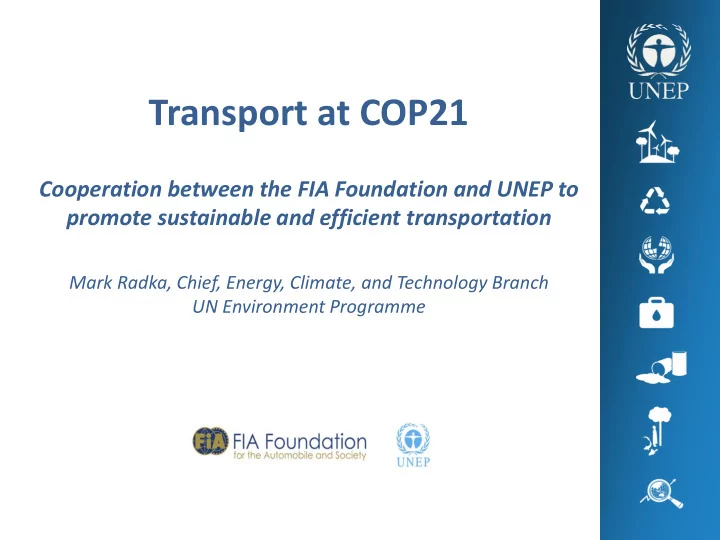

Transport at COP21 Cooperation between the FIA Foundation and UNEP to promote sustainable and efficient transportation Mark Radka, Chief, Energy, Climate, and Technology Branch UN Environment Programme
Climate Change and Transportation The transport sector is • responsible for one quarter of 2.5 energy related CO2 emissions , Billion light duty passenger vehicles 2 going to one-third by 2050 Transport emissions are growing 1.5 • faster than in any other sector 1 The number of vehicles set to • 0.5 double, and almost all growth is in low and middle income countries 0 2000 2005 2010 2015 2020 2025 2030 2035 2040 2045 2050 The sector is a arge source of • OECD Non-OECD short lived climate pollutants Social, economic, and environment impacts are important: air • quality, road safety, congestion
Carbon Reduction - Transport • There is potential for transport to reduce 4 GT/yr in 2030 and 8 GT/yr in 2050 (IEA MOMO model 2015) • A comprehensive approach is needed: • Avoid transport, for example through better city planning • Shift to efficient transport modes, like public transport • Improve through cleaner vehicles • The biggest potential lies in improving vehicle efficiency
UNEP’s Sustainable Transport Work • Promoting walking and cycling infrastructure (Share the Road) • Clean fuels (unleaded & low sulfur - PCFV) • Clean and efficient vehicles (GFEI) • Africa sustainable transport roadmap (ASTF) • Clean ports (CCAC programme) • Electric mobility
Share the Road – Linking Environment and Road Safety To promote the systematic investment in NMT infrastructure • To ensure that all urban roads have walking and cycling elements • Working with national governments and city governments at the • global and operational levels Triple wins: • environment road safety accessibility Two examples: Uganda parliament adopted national non-motorized • transport policy, and Nairobi allocated 20% of its road budget in 2016 for NMT infrastructure 5
Before After
Cleaner and More Efficient Vehicles FIA Foundation and UNEP are co-founders of • Global Fuel Economy Initiative Other partners: ITF, IEA, ICCT, UC Davis • GFEI is the leading global programme to • promote more efficient vehicles Issue prioritized by G20/ SDGs/ SE4ALL • Target: double the efficiency of the global fleet • by 2050…. implies all new vehicles by 2030 Going from an average of 8.3 l/100km (2005) to • 4.2 l/100 km Activities at global, regional and national levels •
GFEI at COP21 • Fuel economy improvement crucial for any 2 °C scenario • Push to go to 100 countries – “100 for 50 by 50” • New financial and support commitments of $7 million - from EC, FIA Foundation, UNEP, Germany, others • Adding 40 country projects to the current 27
GFEI at COP21
GFEI at COP21
GFEI at COP 21 GFEI fits in the Transport and Energy • Efficiency segment of the LPAA Several substantive events (Transport • Day, UNEP’s Energy Efficiency event) Launch of new global phase with • additional country projects and extra financial support Launch of the new State of the World • Fuel Economy Report
Key Findings of the Report Policies and incentives do work and result in better fuel economy • Although new low- and no-emissions vehicles are being • introduced, most emissions reductions will come from fuel economy improvements in the coming decades OECD countries are almost on track to achieving GFEI target of • doubling fuel economy Non-OECD countries, however, are making little progress • There is a need to reach out to all countries to establish fuel • economy policies and incentives Measuring progress is important. •
Final Remarks • The FIA Foundation and UNEP are working together on several leading global programs that promote cleaner and more sustainable transport • These programmes are fully integrated in global goals, mandates and targets, but have local benefits • Transportation, and fuel economy in particular, are essential elements of limiting global temperature rise to less than 2 °C
Recommend
More recommend